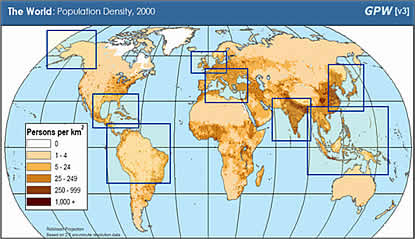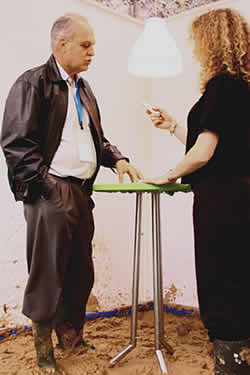
by Signe Agner Holm
Student Climate Press
Copenhagen - Denmark

I am 22 years old, studying veterinary science, 2nd. year at the Faculty of Life Science, University of Copenhagen. Besides that I'm vice chair of the faculty student union and I take part in a lot of other activities (e.g. the climate press). The climate press* is of course hoping to join the COP15** in Copenhagen in December, but our main goal was the IARU-conference***. After the conference we made a newspaper, which was handed out at all Danish universities.
Climate changes make Central and South America suffer
Climate changes are a major issue in Brazil and Mexico. The populations of both countries can already feel the consequences; especially the poor are affected. Local climate experts point out that there will be major problems with food security and migration in near future.
The climate changes have already shown their faces in Brazil. The tropical climate hides the eventual rise in temperature, but invites to flashfloods and landslides. These types of hazards have become more and more common. On top of that some areas in Brazil, as well as in Mexico, are experiencing an increase in draughts, which especially affects the poor populations.
"You can clearly see that most of the migration in our country, comes from the dry lands, where the draugts hit", says Mexican Dr. Úrsula Oswald Spring from the United Nations University in Germany.
Draugths hit corn production
According to Dr. Spring Mexico stands to loose 27 % of their cornfields due to draughts. 25 million people live from the corn production and the draught will hit these rural areas. Also more than 5000 people have migrated from the Toscana area in Mexico, due to floods.
Carlos A. Nobre, director of Center for Earth System Science in Brazil comments: "When 90 % of the natural hazards in Brazil are climate related, it’s clear that the hazards are imposing a heavy burden on poor Brazilians and their security".
50 % of the Brazilian population are poor and live primarily in the periphery of the big cities or as farmers at the country side. These 94 million people are very vulnerable to environmental stress.
Risks make people migrate
Security risks such as reduction of food security and water right security - due to more frequent and intense natural hazards - are the major issues for these parts of the population. Reduction in jobs and therefore food resources is one of the main reasons why people migrate and this leads to other problems.
"Today half a million young people are involved in the drug trafficking in Mexico. They don’t have any alternatives in getting money", says Dr. Spring and continues: "We now know that three million people in Mexico become poor as we speak and two million of these due to lack of food production. Children are born with brain damages because of lack of nutrients and this will only get worse, if or when the climate changes really kick in".
Both Brazil and Mexico are already experiencing sea level rises. Brazil has 8500 kilometres of coastline and the sea level rose 20 cm in the last century.
Both scientists agree that in the coastal zones of the two countries, people will be forced to move. The countries will have serious problems, if they do not learn to adapt and deal with new risk issues.
Migration biggest security problem
Professor Ole Wæver at Copenhagen University, Denmark is an expert in international politics: "Migration is the biggest security problem when we´re talking climate change. Migrating people suffer two types of security risk. First they loose their income, home, land and background and then they face the risk of stepping upon other peoples land and property, which most often bring conflicts".. He adds: " in the future the resource problem itself will probable not be as big a security risk as migration".
Ole Wæver believes that the many future migrations will affect the whole world: "Of course countries like Brazil and Mexico will be most vulnerable and affected, but the developed countries will also have to face it. Relocation of so many people will change the present balance and way of thinking; it will become a completely different world, culturally and politically".
Carlos A. Nobre and Úrsula Oswald Spring both think that their countries can overcome their challenges.
"But we have to develop, increase and enhance our adaptive capacity and most important; we have to prepare the population to cope with the climate changes and everything it brings with it", says Carlos A. Nobre.
The areas that first will be exposed to sea level rise:

Dr. Úrsula Oswald Spring predicts that sea level rise will be one of the biggest security risks in the nearest future for Mexico and Brazil.

Carlos A. Nobre was more than happy to try and stand in the same muddy situation as millions of people do when landslides occur in Brazil, but he had to admit that ten minuts in the mud was more than enough, and he felt sorry for the people who are forced to live in it everyday.
* The student climate press is a project from University of Copenhagen that aims to close the gap between scientists and the rest of us. They are not journalist, but science students. We visited the Climate Change conference in Copenhagen and communicate how we experience it. You can find a bit of info about the project on our website www.studentclimatepress.dk
** The Danish Government will host the United Nations Climate Change Conference (COP15) in December 2009. It is organized by International Alliance of Research Universities (IARU).
*** The University of Copenhagen host an international scientific congress on climate change under the heading "Climate Change: Global Risks, Challenges and Decisions", 10-12 March 2009 in Copenhagen, Denmark. The congress was organized in cooperation with nine other universities in the International Alliance of Research Universities (IARU). IARU members: Australian National University, ETH Zurich, National University of Singapore, Peking University, University of California, Berkeley, University of Cambridge, University of Copenhagen, University of Oxford, University of Tokyo, Yale University.
Send this page to a friend
|